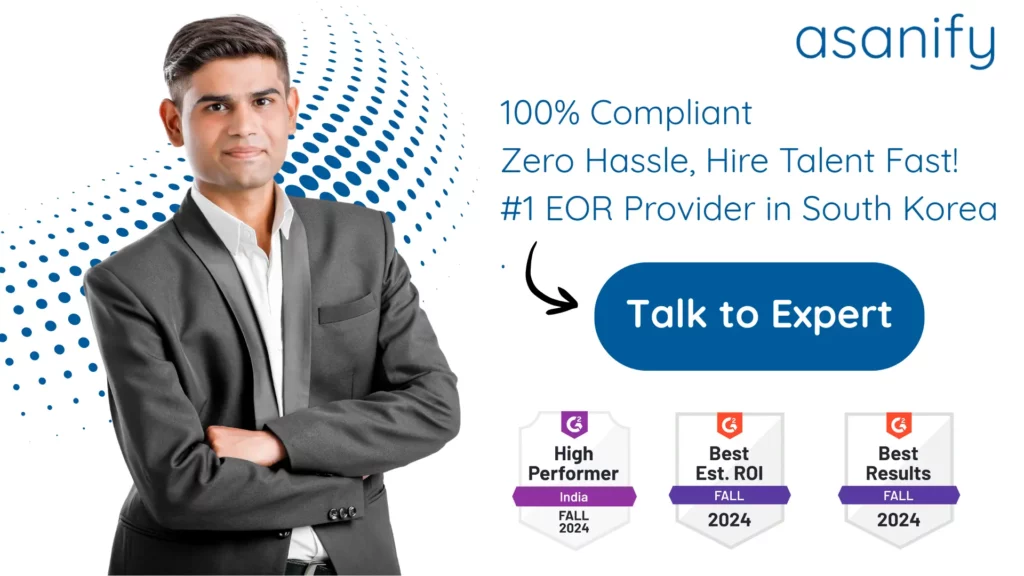South Korea in 2025 remains a highly attractive destination for global businesses thanks to its robust economy, advanced technology infrastructure, and strategic location in East Asia. With a strong domestic market and access to regional markets like China and Japan, South Korea is ideal for companies in sectors like electronics, software, automotive, manufacturing, and biotech.
Seoul, Busan, and Incheon are the country’s primary business hubs, offering opportunities for both startups and multinational corporations. Companies planning to register a business in South Korea can benefit from a well-developed legal system, strong intellectual property protection, and government initiatives promoting foreign investment.
This guide walks you through market entry options, business structures, registration steps, documents, costs, compliance requirements, and Employer of Record (EOR) alternatives to help foreign companies expand into South Korea efficiently.
Table of Contents
- Exploring Your Market Entry Options in South Korea
- Business Structures You Can Choose From
- Comparing Business Structure Options
- How to Choose the Right Business Model for Your Operations
- Step-by-Step Guide to Company Registration in South Korea
- Key Documents Required to Register Your South Korean Company
- Post-Incorporation Essentials You Shouldn’t Ignore in South Korea
- Additional Business Licenses and Registrations You Might Need in South Korea
- Timeframe to Set Up a Business in South Korea
- What Does It Cost to Incorporate a Company in South Korea?
- Obstacles Global Founders May Face While Setting Up in South Korea
- Incorporating as a Foreign-Owned Company: A Special Path
- Employer of Record: A Simpler Way to Hire in South Korea Without Incorporation
- Why Asanify is the Ideal Partner for Global Companies Entering South Korea
- Summary & Final Takeaways
- FAQs
Exploring Your Market Entry Options in South Korea
Global companies can enter South Korea in two main ways:
Incorporating a Local Business Entity
Registering a local entity is the traditional route for companies planning a long-term presence. This involves filing with the Commercial Registry under the Supreme Court of Korea and registering with the National Tax Service (NTS). Incorporation is ideal for companies seeking full operational control, local hiring, and the ability to sign contracts directly in Korea.
Hiring Through an Employer of Record (EOR)
For businesses that want to explore the South Korean market without setting up a legal entity, an Employer of Record provides a compliant and cost-effective alternative. The EOR serves as the official employer of your Korean workforce, handling contracts, payroll, tax withholdings, and social insurance contributions, while you manage day-to-day operations. This model is ideal for market testing, short-term projects, or small distributed teams.
Business Structures You Can Choose From
Foreign investors can choose from several entity types in South Korea:
- Local Corporation (Chusik Hoesa) – Similar to a private limited company; offers limited liability and is the most common structure for foreign investors.
- Limited Liability Company (Yuhan Hoesa) – Smaller and more flexible structure with simpler governance requirements.
- Branch Office – Extension of a foreign company; can conduct business and earn revenue in Korea.
- Liaison Office – Non-revenue-generating; used for market research and coordination only.
- Partnership – Less common for foreign businesses due to unlimited liability for partners.
Comparing Business Structure Options
| Structure | Ownership | Liability | Taxation | Best For |
| Chusik Hoesa (Corporation) | 1+ shareholders | Limited | Corporate tax | Startups and long-term operations |
| Yuhan Hoesa (LLC) | 1+ members | Limited | Corporate tax | Small to medium-sized businesses |
| Branch Office | Foreign parent | Parent liable | Corporate tax | Revenue-generating extensions of foreign companies |
| Liaison Office | Foreign parent | Parent liable | None | Market research or liaison activities |
| Partnership | 2+ partners | Unlimited | Personal tax | Local businesses with shared ownership |

How to Choose the Right Business Model for Your Operations
Selecting the right business model depends on your company’s objectives, risk tolerance, and market strategy:
- Chusik Hoesa is ideal for foreign businesses seeking long-term growth, credibility, and limited liability.
- Yuhan Hoesa is better suited for smaller ventures or service-based companies.
- Branch offices work well for companies with existing foreign entities that want to generate revenue in Korea without forming a new legal entity.
- Liaison offices are the simplest option for market research or early-stage exploration.
- EOR is the most efficient solution for fast and low-risk market entry without incorporation.
Suggested Read: Understanding Labour Laws in South Korea: Contracts, Work Hours, and Termination Rules
Step-by-Step Guide to Company Registration in South Korea
- Decide on your business structure based on your goals, liability needs, and operations plan.
- Secure a registered office address in Korea for incorporation purposes.
- Prepare the Articles of Incorporation and other required documents, including shareholder IDs and notarized resolutions for foreign companies.
- Deposit the required minimum capital in a local Korean bank account.
- Register the company with the Commercial Registry under the Supreme Court of Korea to obtain a business registration certificate.
- Register with the National Tax Service (NTS) to receive a tax identification number and register for VAT if applicable.
- Enroll employees in social insurance programs, including National Pension Service (NPS), Health Insurance, Employment Insurance, and Industrial Accident Compensation.
- Obtain sector-specific licenses or approvals if your business operates in regulated industries like finance, healthcare, or manufacturing.
The full process typically takes 3–6 weeks, depending on document preparation and approvals.
Key Documents Required to Register Your South Korean Company
- Passports or IDs of all shareholders and directors
- Proof of residential address for all investors
- Articles of Incorporation and notarized corporate resolutions
- Certificate of bank deposit for paid-in capital
- Lease agreement for the registered office address
- Power of Attorney for local representatives, if applicable
- Sector-specific licenses if your business requires them
Post-Incorporation Essentials You Shouldn’t Ignore in South Korea
After registration, companies must comply with several legal obligations:
- Open a permanent corporate bank account for operations and tax payments
- File quarterly and annual corporate tax returns with the NTS
- Maintain proper accounting records in accordance with Korean GAAP
- Contribute to mandatory social insurance programs for employees
- Renew licenses and update business registrations for any changes

Additional Business Licenses and Registrations You Might Need in South Korea
Certain industries require additional approvals before you can legally operate:
- Food and drug licenses for F&B and pharmaceutical companies
- Import/export registrations for trading businesses
- ICT or software development approvals for technology companies
- Environmental permits for industrial and manufacturing operations
Timeframe to Set Up a Business in South Korea
| Step | Estimated Duration |
| Company name verification and document preparation | 3–5 business days |
| Bank account opening and capital deposit | 3–7 business days |
| Commercial Registry filing and approval | 7–10 business days |
| Tax registration and social insurance enrollment | 5–7 business days |
| Total Time to Register | 15–30 business days |
What Does It Cost to Incorporate a Company in South Korea?
- Registration and government fees: $800–$1,500
- Legal and notary services: $1,000–$3,000
- Corporate bank account setup: Minimal but may require deposit verification
- Accounting and compliance setup: $1,000–$3,000 annually
- Sector-specific licensing (if applicable) may increase costs
Overall, incorporation costs typically range from $3,000 to $8,000, excluding share capital requirements.
Obstacles Global Founders May Face While Setting Up in South Korea
- Language barriers and requirement for Korean-language filings
- Need for notarized and apostilled foreign documents
- Multi-step process involving several government agencies
- Sector-specific regulations and licensing requirements
- Bank account opening often requires in-person verification
Incorporating as a Foreign-Owned Company: A Special Path
Foreign investors can choose among:
- Wholly owned subsidiaries (Chusik Hoesa or Yuhan Hoesa)
- Branch offices for revenue operations under a foreign parent
- Liaison offices for non-commercial representation
South Korea allows 100% foreign ownership in most sectors, but industries like broadcasting, energy, and defense require special approvals or joint ventures with local partners.

Employer of Record: A Simpler Way to Hire in South Korea Without Incorporation
Entering the South Korean market does not always require establishing a local legal entity. For many global companies, especially those exploring market potential or launching pilot projects, an Employer of Record provides a fast and fully compliant way to hire employees in South Korea without the costs, delays, and complexity of full incorporation.
From a legal perspective, the EOR becomes the official employer of your South Korean workforce. It manages employment contracts, payroll, tax withholdings, and social insurance contributions in compliance with South Korean labor laws, while your company retains full control over employees’ day-to-day responsibilities, workflows, and performance management.
This model is ideal for:
- Testing the South Korean market before committing to a permanent entity
- Running short-term or project-based teams in technology, operations, or support
- Hiring remote South Korean employees for global or regional projects
- Quickly expanding into East Asia without dealing with complex incorporation processes
Using an EOR also shields foreign companies from the administrative and compliance challenges of:
- Drafting contracts that follow South Korea’s Labor Standards Act
- Managing payroll tax filings with the National Tax Service (NTS)
- Registering and contributing to mandatory programs like National Pension, Health Insurance, and Employment Insurance
- Ensuring compliance with working hours, leave entitlements, and severance pay requirements
By leveraging an EOR, companies minimize the risk of non-compliance, worker misclassification, and potential labor disputes, while entering the South Korean market efficiently and cost-effectively.
Suggested Read: Employer of Record South Korea: A Comprehensive Guide
Why Asanify is the Ideal Partner for Global Companies Entering South Korea
Asanify provides end-to-end support for international companies entering South Korea, offering both full incorporation and Employer of Record (EOR) services. For businesses planning long-term operations, we guide you through the complete registration process:
- Selecting the right entity type (Chusik Hoesa, Yuhan Hoesa, Branch Office, or Liaison Office)
- Preparing and filing Articles of Incorporation and corporate documents
- Registering with the Commercial Registry and the National Tax Service (NTS)
- Setting up payroll, accounting, and social insurance contributions
- Managing post-incorporation compliance and annual filings
If you are not ready to incorporate, our EOR solution allows you to hire South Korean employees in just a few days. Asanify handles employment contracts, payroll processing, tax filings, and statutory benefits, ensuring your team operates fully within South Korean regulations without administrative burden.
Asanify has successfully supported clients from Asia, Europe, the US, and the Middle East, helping them build South Korean teams quickly and without risk. Whether you are a startup testing market potential or a multinational establishing a regional presence, we make your South Korea expansion seamless and compliant.
Summary & Final Takeaways
South Korea in 2025 presents significant opportunities for global companies across technology, manufacturing, and services. Businesses typically have two primary options for entering the market: incorporating a local entity or hiring through an Employer of Record (EOR).
If your goal is to establish a long-term presence, raise capital, or maintain complete operational control, setting up a registered South Korean company is the right path. On the other hand, if your focus is on rapid market entry, pilot projects, or building a small local team without legal complexity, an EOR enables you to start operations immediately while staying fully compliant with South Korean labor and tax regulations.
FAQs
It typically takes 15–30 business days depending on document preparation and approvals.
Yes, 100% foreign ownership is allowed in most sectors, except for certain restricted industries.
For a Chusik Hoesa (corporation), the recommended minimum is around KRW 100 million, but it varies by sector.
Not always, but opening a corporate bank account often requires in-person verification.
Yes, through an Employer of Record (EOR) for fully compliant and quick hiring.
Corporate income tax ranges from 10% to 25%, plus VAT of 10% and social insurance contributions.
Yes, sectors like finance, broadcasting, healthcare, and manufacturing require additional licenses.
Language barriers, document notarization, and navigating multi-agency registration processes.
A branch can generate revenue, while a liaison office is limited to market research and cannot engage in sales.
Using an Employer of Record (EOR) allows immediate hiring without the need for incorporation.
Not to be considered as tax, legal, financial or HR advice. Regulations change over time so please consult a lawyer, accountant or Labour Law expert for specific guidance.

